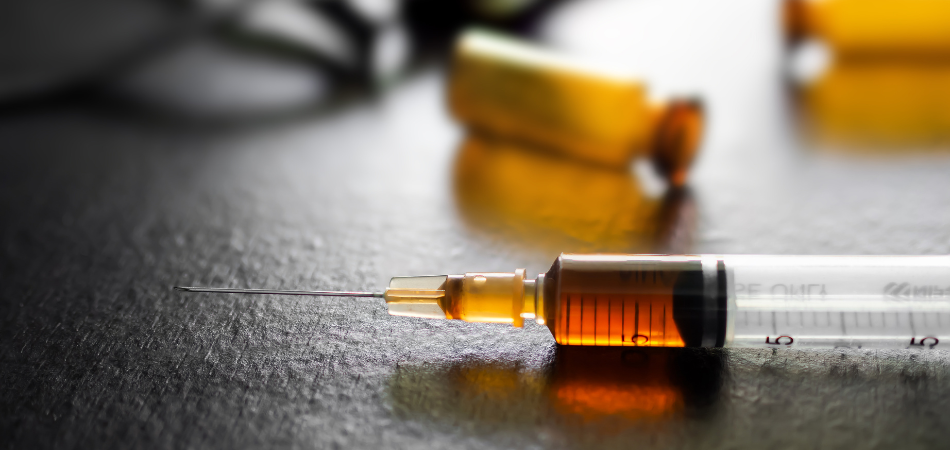Ketamine addiction
Ketamine, also referred to as ‘ket’, ‘horse’ or ‘special k’, is a potent hallucinogenic drug that is responsible for sedating users and invoking a dissociative state, distorting perception of sights and sounds. Ketamine initially started out as an anaesthetic in hospitals and veterinary clinics and is still used today in medical settings. However, this drug has also branched out into the party scene, with 3.2% of young people aged sixteen to twenty-four reported to have used ketamine – a figure that continues to rise.
The adverse effects of addiction through ketamine abuse can be devastating. With this worrying trend showing no signs of slowing down, it is vital that you seek professional help if you feel like your ketamine use is spiralling out of control.

How does ketamine addiction develop?
Ketamine produces its effects by acting on key neurotransmitters in the brain, particularly glutamate. Ketamine addiction can develop fairly quickly because of the drug’s strong ability to produce feelings of euphoria and dissociation. Regular use of ketamine disrupts the normal functioning of the brain, altering its reward pathways and making it extremely difficult to quit using the drug.
In addition, there are physical withdrawal symptoms associated with quitting ketamine, which makes resisting cravings even more challenging.
Anyone can be at risk of developing a ketamine addiction, as this substance has been found to have powerful addictive properties. However, there are some factors that could increase the risk of ketamine addiction taking hold. These include:
- Psychological factors: those suffering from mental health issues or emotional trauma are more likely to abuse ketamine in an attempt to self-medicate or escape reality.
- Genetic factors: there is a strong link between genetics and addiction, so those with family members who have struggled with substance abuse may also be at higher risk for developing a ketamine addiction.
- Social factors: pressure from peers, feeling a need to “fit in”, or feelings of loneliness and isolation can contribute towards a ketamine addiction developing.
Any combination of physical factors, social pressures and environmental influences can make someone more prone to developing a ketamine addiction. Recognising these risks can prevent ketamine addiction from developing and protect your health and well-being.
How do I know I’m addicted to ketamine?
An addiction to ketamine is defined by the often-uncontrollable urge to use the drug despite knowing the negative impact it is having on your life. Though it can be difficult to pinpoint the exact moment that you become addicted to ketamine (as this generally happens over time), there are certain signs that may point to a developing problem.
Signs you may have a ketamine addiction include:
- Cravings for ketamine when you are not using it.
- Spending excessive amounts of money and time on buying and using ketamine.
- Prioritising ketamine use over other responsibilities, such as work or studying.
- Taking increasingly higher doses of ketamine to feel the same high.
- Experiencing withdrawal symptoms when you try to stop taking ketamine.

Perhaps your friends and family have expressed concerns about your ketamine use, or maybe you are starting to feel a decline in your mental and physical health. If any of these statements apply to you, it is crucial that you do not wait. Drug addiction is not a problem that will go away on its own – it requires the assistance of experienced medical professionals.
The dangers of ketamine
The recreational use of ketamine poses a significant risk to your mental and physical health. Taking too much of this powerful drug can be hazardous, with high doses associated with unpleasant hallucinations and a detachment from reality, also known as a “K-hole”.
Some other side effects of ketamine use include:
- Sedation
- Out-of-body experiences
- Altered sense of reality
- Confusion and disorientation
- Difficulty concentrating
- Memory loss
- Anxiety
- Agitation and mood swings
- Dizziness
- Impaired coordination and reflexes
- Nausea and vomiting
- High blood pressure
- Decreased or irregular heart rate
- Slow, shallow breathing or cessation of breathing
- Seizures
Those who abuse ketamine for a long period of time put themselves at risk of serious long-term consequences that can be irreversible.
Some long-term effects of ketamine use include:
- Damage to internal organs which can be permanent, including the liver and kidneys
- Urinary tract issues, including ulcerative cystitis
- Impaired memory
- Impaired cognitive function
- Respiratory issues
- Behavioural changes
- Mood swings
- Anxiety and depression

As you can see, the consequences of ketamine abuse are no laughing matter. Ketamine addiction can result in chronic, painful health conditions and long-term damage to your body. If you or someone you love is struggling with ketamine addiction, seek help immediately in order to mitigate the risks of this dangerous condition.
Ketamine detox and withdrawal
Ketamine detox, or the process of removing ketamine from the body and overcoming its associated withdrawal symptoms, can be a challenging but ultimately rewarding experience. During the detox process, the body will naturally begin to rid itself of built-up toxins and start to heal. This is the first stage in recovery and an important first step towards your goal of sobriety.
Some withdrawal symptoms you may experience during ketamine detox can include:
- Nausea
- Headaches
- Irritability and agitation
- Confusion
- Shaking and sweating
- Heart palpitations
- Sleep disturbances
- Fatigue
- Depression and anxiety
- Impaired cognitive function
While ketamine withdrawal symptoms can be unpleasant, undergoing ketamine detox under the guidance of the medical staff at Liberty House will ensure you remain safe and comfortable. We can help you manage your symptoms in a secure environment, as well as provide supportive therapeutic care.
Taking part in a ketamine detox programme at a rehab facility also removes the risk of relapse. It is all too common for those attempting to detox alone to revert back to old habits when withdrawal symptoms and cravings become too much to bear. This puts you at a greater risk of overdose as you consume previous doses of ketamine which, after a period of abstinence, your body is no longer accustomed to.
What happens in ketamine rehab?
At Liberty House, our clients undergo a comprehensive rehab treatment programme that addresses both the psychological and physical factors associated with addiction. During this process, you will receive various forms of therapy and counselling in order to help you understand the underlying causes of your addiction, as well as learn how to manage any triggers or cravings you may experience.
Some therapies provided at Liberty House include:
- 12-step programme
- Group therapy
- Dialectical behavioural therapy (DBT)
- Family and social therapy
- Solutions-focused therapy
- Sound therapy
- Yoga and meditation
- Gong bath therapy

A previous UKAT client, Carl, shares his rehab experience, saying:
“It’s just an environment in which you are not judged. You’re not told to do things. The more you give, the more you get out of it. If you want to change then it’s available for you.”
The environment of our ketamine rehab facility is structured and supportive, with a team of caring professionals working together to help you overcome your substance abuse. Our clients can expect to receive plenty of individualised attention and support from clinicians and other staff members, who are dedicated to helping every single person achieve long-term sobriety. More broadly, you are also likely to engage with other addicted individuals in a supportive and understanding setting, which can be an important factor in recovery from ketamine addiction.
Tips for a successful ketamine rehab experience
Ketamine rehab is an important process for individuals who are struggling with ketamine addiction, and there are several key things that you can do in order to ensure that your rehab experience is as successful as possible.
Some of our top tips include:
- Seek out a high-quality rehab facility
- Set clear, specific goals for yourself
- Participate in therapy sessions
- Stay in the programme
- Get plenty of exercise and rest throughout the process
- Maintain a healthy, well-balanced diet
- Have a strong support network of family and friends
- Start a new hobby or do something that interests you
While ketamine rehab can be a challenging obstacle to overcome, it will also be the most rewarding thing you will ever do. Completing ketamine rehab will leave you feeling proud of your achievements and ready to start a new life.
A life without ketamine
By breaking free from your addiction through ketamine rehab, you can start to rebuild your life and reclaim your health and well-being. With the help of professionals who understand the complexities of ketamine addiction, you can develop effective coping skills that allow you to manage stressors without turning to drugs as a way to cope.
Furthermore, by providing a structured environment that offers accountability along with supportive counselling sessions, ketamine rehab can foster positive behavioural changes over time.
As you progress through treatment and build on your successes in therapy, you may begin to experience not just decreased cravings for ketamine, but also increased feelings of motivation and self-confidence. With this comes physical healing from the harm caused by ketamine abuse – you will regain your strength and ultimately improve your quality of life
Whether you are dealing with your own personal struggles or you have a loved one who needs help overcoming a hallucinogen addiction like this, consider reaching out for professional support today and reap the benefits of a healthier, happier life.

